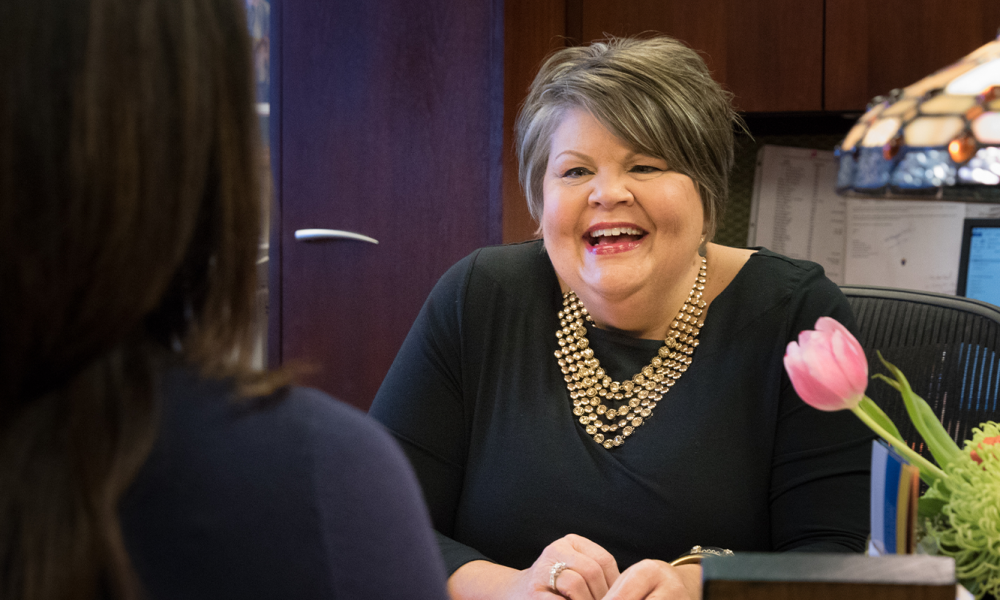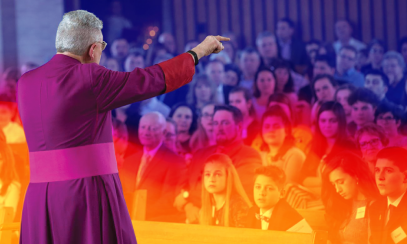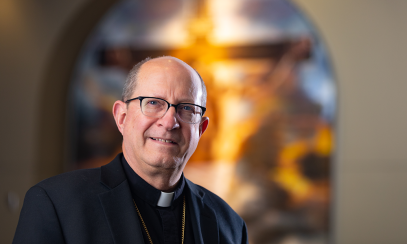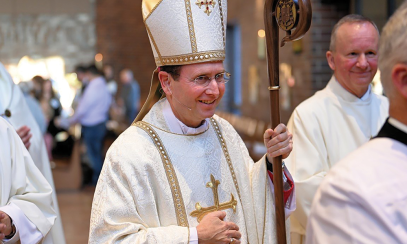
Called to Lead
Nancy Werner has served the Church for 34 years in both parish and diocesan ministry, and considers her vocation her greatest passion. In her current role as chancellor of the Archdiocese of St. Louis, she serves Archbishop Robert Carlson as an administrator and advisor, a role she also played for him in the Diocese of Saginaw. As a leader in both large and small dioceses, Nancy has a unique understanding of the ways in which the Church can evangelize more effectively. Content Evangelist sat down with Nancy to learn more about her insights.
CE: You’ve been the chancellor for Archbishop Carlson when he was Bishop of both Saginaw and Sioux Falls, then later at the Archdiocese of St. Louis. What are the challenges and opportunities with what a larger diocese can do versus a small diocese?
NW: The opportunity in each diocese, regardless of size, has been to connect the bishop to the great people of the local Church and, together, grow in holiness. In my role as chancellor, I accomplish this by working closely with priests, deacons, religious, community leaders and staff. Both dioceses have had tremendous amounts of generosity, commitment to our Catholic faith, and talented clergy, religious and lay people.
The distinctions between the places I have served lie in their history, layers, and size; Sioux Falls has about 135,000 Catholics v.s 500,000 in St. Louis. Though the goals and objectives are really the same for me, the challenge is it simply takes more time to study the needs and implement initiatives within the larger Archdiocese of St. Louis. I have served for 34 years in both parish and diocesan ministry and bring a great deal of experience with me. I consider my vocation my greatest passion and life’s commitment, and love juggling multiple priorities and connecting people to the Church and Church leaders.
CE: The Archdiocese of St. Louis has a reputation for excellence in communications. What advice do you have for other diocesan leaders in both large and small settings?
NW: The archdiocese truly is a leader in communication, publication and planning. Their reputation pre-dates my arrival in 2009. In 2011, we worked with the USCCB to put together a communications strategy; this roadmap was updated in 2016. Helping our team remain cutting edge is our Communication Advisory Board of local professionals who meet quarterly to collaborate and share resources. We also have an annual Communication Colloquium, bringing together professionals and volunteers who learn, share, support and grow together.
One of the challenges in the current communication business is finding tools to deliver our message to every household, backed by a strong social media plan. We believe by moving from simply reporting the news, to seeing ourselves as lead evangelists in our publications, website and elsewhere, we can accomplish this. We are constantly looking to connect people with stories of faith that resonate with their own. We understand how vital it is to share faith with others.
We work very hard at being great communicators. Archbishop Carlson presents an Excellence in Communication Award each year, allowing him to honor someone in the essential field of communication.
CE: Why have you felt FAITH catholic is a fit in both large and small diocesan settings?
NW: I love FAITH! I first met FAITH in Saginaw, Mich., when (then) Bishop Carlson introduced the publication to the staff and people of the diocese. He did the same when he became archbishop of St. Louis. Archbishop Carlson committed to FAITH magazine as a way to reach every diocesan household with a personal message. This outreach is invaluable. It’s a way to evangelize, catechize, and promote the Church in a beautiful, attractive and professional format. What an amazing product of evangelization for all ages.
In my role as chancellor, I supervise the Communication, Publications and Planning departments and know how closely our publication team works with FAITH to produce this incredible product. Their joint collaboration affords opportunities for both groups to learn from each other’s expertise and techniques. When I’m out and about in the archdiocese, I hear wonderful stories of what people have read in the magazine or chatting about an article they liked best. FAITH helps all of us to be great evangelists!
CE: CARA reports that more than 30 percent of diocesan chancellors are women, 21 percent of whom are lay women. What perspective do you have regarding the role women can play in church leadership and what advice do you have for women who are called to serve the Church?
NW: I am living proof that lay women can play a significant leadership role in our Church. My vocation began in parish youth ministry, followed by the position of diocesan director of youth ministry in Sioux Falls. I was then appointed by Archbishop Carlson as chancellor in both Saginaw and St. Louis, serving with him for 23 years. This particular position was not something I sought, but feel it is a good fit with my natural gifts of organization, managing people and products, developing relationships with key players, connecting the dots and building bridges.
You have to like people in this business, and often become the gateway to important conversations, especially where generosity or patience are needed. Women often possess the innate gifts necessary for this: nurturing others and forward focus. As a lay woman in Church leadership for decades now, I see my greatest contribution as being a role model to others and the great privilege of being a voice at the table
of important conversation.
I stand on the shoulders of countless women (and men) who have dedicated their lives to serving the Church. They are true, joyful trailblazers and I am profoundly grateful for their witness and testimony to its importance. I, too, feel the responsibility to invite women to consider ministry as a vocation, and am energized by the women who are two and three generations younger than me. They are leading and ministering with their own energy.
In my wallet, I carry a quote by Frederick Buechner, “The place God calls you to is the place where your deep gladness and the world’s hunger meet.” These words sum up how I feel about my ministry, my leadership in the Church.



